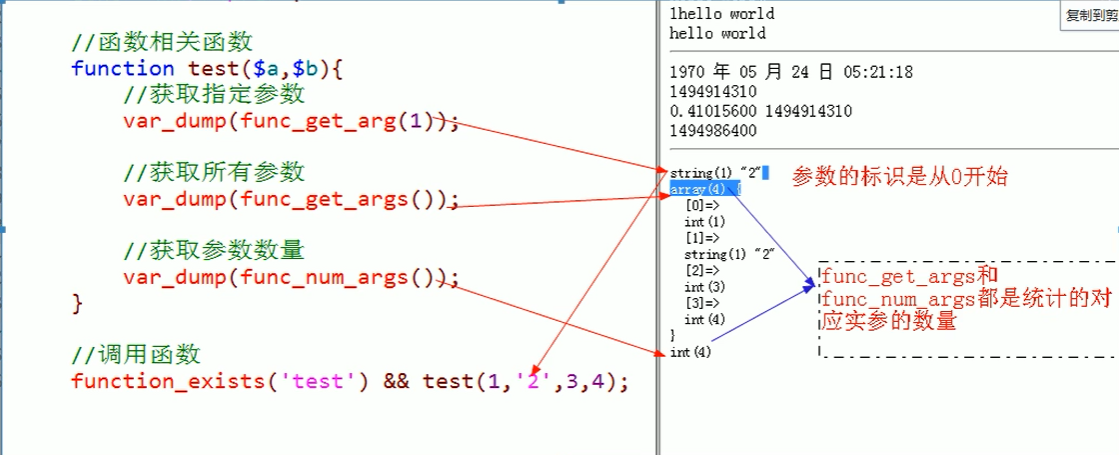-
print():类似于echo输出,本质是一种结构(可以不使用括号),不是函数,返回值为1
-
print_r():类似于var_dump,但比它简单,不会输出数据的类型,只会输出值
1 示例: 2 <?php 3 echo print('hello world'); 4 print 'hello world'; 5 $a='hello world'; 6 print_r($a); 7 ?> 8 //结果:hello world 9 1helloworld //1:echo print() 10 hello world
2、有关时间的函数
-
date()
按照指定格式对应的时间戳(从1970年格林统治时间开始计算的秒数),如果没有指定特定的时间戳,那么就是默认解释当前的时间戳
-
time()
获取当前时间对应的时间戳(返回1970年1月1日00:00:00到当前时间的秒数)
-
microtime()
获取当前量秒级别的时间
-
strtotime()
按照规定格式的字符串转换乘时间戳
1 示例: 2 <?php 3 echo date('y 年 m 月 d 日 H:i:s',12345678); 4 echo time(),'</br>'; //</br>换行 5 echo microtime; 6 echo strtotime('tomorrow 10 hours') 7 ?> 8 9 //结果: 10 1970年05月24 05:21:18 11 1494913599 12 0.76953200 1494913599 13 1494986400
3、有关数学的函数
-
max():返回参数中最大的值
-
min():返回参数中最小的值
-
rand():返回一个随机值
rand(5,15):返回5到15之间的随机数
-
mt_rand():与rand一样,只是底层结构不一样,效率比rand高(建议使用)
-
round():四舍五入
-
ceil():向上取整
-
floor():向下取整
-
pow():求指定数字的指定指数次结果
pow(2,8)==2^8==256
-
abs():求绝对值
-
sqrt():求平方根
4、有关函数的函数
-
function_exists():判断指定函数名字是否在内存中存在(帮助用户不去使用一个不存在的代码,让代码安全性更高)
-
func_get_arg():在自定义函数中获取指定数值对应的参数
-
func_get_args():在自定义函数中获取所有的参数(数组)
-
func_num_args():获取当前自定义函数的参数数量
1 function test($a,$b){ 2 //获取指定参数 3 var_dump(func_get_arg(1)); 4 //获取所有参数 5 var_dump(func_get_args()); 6 //获取参数数量 7 var_dump(func_gnum_args()); 8 } 9 //调用函数 10 function_exists('test') && test(1,'2',3,4);
